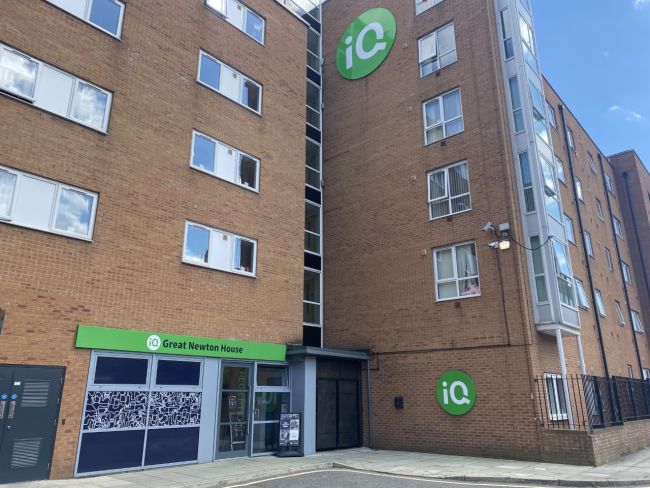‘Embracing the unexpected’ means something different to everyone
By Anjula Mutanda, VP of relationship support charity, Relate.
My 18 year-old daughter starts university in October so when I was asked to join a panel discussion at the Roundhouse on making friends at university for the launch of iQ’s Embrace the Unexpected campaign, it couldn’t have come at a more poignant time.
Of course I’m excited for my daughter but, as any parent would be, I’m also a little anxious. I want her to have a positive experience at university and I know from my time as a student counsellor, the huge role that relationships play in university life.
iQ’s new campaign looks at why some students experience loneliness more than others and what can be done to bring people together and improve student wellbeing. This is so important - when you’re living away from home for the first time, the new friends you make become a vital part of your support network. If you’re feeling down, having somebody to talk to can make the world of difference, which just goes to show it’s actually the quality of the friendships you have that matters, not the quantity.
But what if you struggle to make friends? Well, it may surprise you to know that according to new research from Relate and iQ, which was revealed at the event, 74% of students said that making friends and building meaningful relationships is one of the biggest challenges facing students when starting out at university. The same research found that 21% said they feel lonely often’ or ‘always’. This turns the idea that loneliness only affects older people on its head. If you’re feeling lonely, the chances are there are lots of other students around you who are in the same position.
So if people are feeling this way, why aren’t they talking about it? Shyness, embarrassment and stigma around loneliness are just some of the reasons why students don’t speak out when they’re struggling.
"If you’re feeling lonely, the chances are there are lots of other students around you who are in the same position."
As I explained during the panel discussion, making the first move can feel daunting. It requires you to show some vulnerability, but this is actually a sign of strength and the rewards are 100% worth it, leading to improved mental health and wellbeing. This is why iQ, together with Relate, is encouraging students to embrace the unexpected.
As we learnt from our panel of experts and members of the audience, embracing the unexpected means different things to different people. For me, when I was at uni, it meant putting myself out there and making friends with some drama students, even though I was studying Psychology. For comedian and mental health campaigner Jack Rooke it meant befriending an accountant and for iQ COO Matt Merrick it meant taking dance lessons, even though he is adamant he is a terrible dancer! Poet Natty Speaks asked the audience how they embraced the unexpected and weaved together responses such as going for counselling, doing a course and going on a Tinder date to make an inspiring poem.
Based on the discussion at the launch event and my experience as a therapist, I’ve put together a few tips for building meaningful relationships at university…
Join a club: Whether it’s a sport club or the Harry Potter society - whatever you’re into its likely there’s something on offer. Friendships tend to develop naturally and organically through shared interests.
Keep an open mind: We often judge people based on their appearances, their interests or their background. Try to cast these things aside when meeting people and keep an open mind. People with different perspectives can enrich your life in wonderful ways.
Don’t put too much pressure on yourself: Remember that friendships take time to develop. Start by inviting a couple of people on your course for a coffee. If it goes well, plan another date but don’t force it.
Stay true to your personality: If you’re naturally more introverted, don’t feel you suddenly have to be the life and soul of the party. Embrace the unexpected but in a way that works for you.
Learn to love yourself: This is most important relationship you’ll ever have. Yoga and mindfulness teach self-love – why not try a class or borrow a self-help book from the library? Find out where the student wellbeing centre is. They usually offer free counselling if you need it, and some run classes on confidence building. Relate also offers individual counselling either face-to-face or online as well as a range of self-help tools.
Find the right accommodation: The majority of students in our research said accommodation made a difference when it came to making friends. If you’re about to start university, do have a think about where you’d like to live and what opportunities there are for interacting with other students such as social spaces and activity nights.
Think beyond Freshers' Week: It’s a great time to meet people but keep yourself open to the idea of new relationships throughout your time at uni. Friendships can form in the most unlikely places, so keep open to opportunities and embrace the unexpected throughout your time at university and your whole life.
Anjula Mutanda is Vice President of relationship support charity, Relate. A psychology and mental health expert, social scientist, presenter, author, psychotherapist and life, careers coach and media consultant, Anjula is also author of Relate’s How to do Relationships.
Search
Location inspiration
If you're not sure where you're heading yet, take a look around our properties in all corners of the UK.

Great Newton House, Liverpool

Shoreditch, London